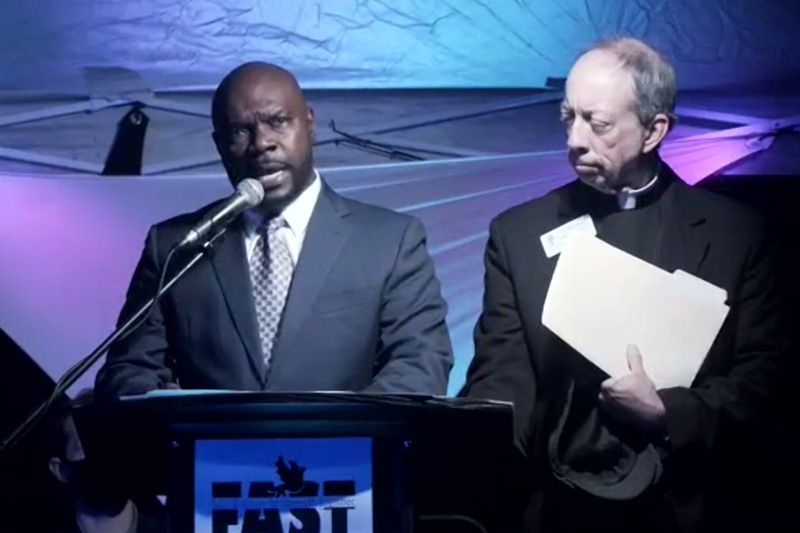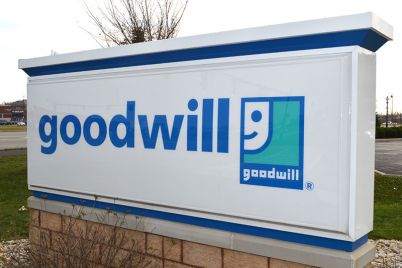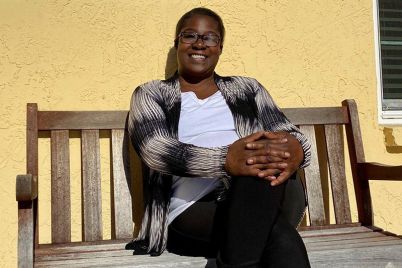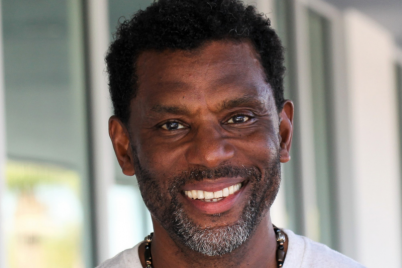Left, Rev. Robert Ward, Mt. Moriah Missionary Baptist and Fr. Tom Anastasia, St. Matthew Catholic, presenting at the 2021 FAST assembly held in the parking lot of Sacred Heart Catholic Church in Pinellas Park or via Zoom.
BY FRANK DROUZAS, Staff Writer
ST. PETERSBURG — At the 2021 Faith and Action for Strength Together (FAST) Nehemiah Action annual meeting on March 22, community and religious leaders agreed to work together on various issues, including problems in the criminal justice system, the lack of affordable housing, and the need to help those struggling with addiction and mental illness.
Rev. Willie McClendon of Shiloh Missionary Baptist Church noted that back in 2012, Florida had the highest youth arrest rate in the nation; over five years, the state arrested more than 20,000 children from 5-12 years old.
“These children were branded for life with criminal records,” he said. “Their records made it hard for them to get jobs, scholarships, and even enter the military.”
The lives of children should not be ruined by mistakes made early in life, the reverend averred. The state set up its Pre-Arrest Diversion (PAD) program as an alternative to first-time, non-domestic misdemeanor arrests. Offending youths may have to do community service or attend anger management or drug treatment sessions, but they would not get criminal records. Young people who go through PAD are twice as likely to stay out of trouble in the future as those who have been arrested, McClendon noted.
“The problem was that not all children who were eligible were getting access to the diversion program,” he said, adding that members of FAST then made a direct appeal to state officials in Tallahassee to make it mandatory for all children to have access to the program.
The effort has paid off. In the last five years, 99 percent of the children in Pinellas and 33,000 statewide who have been eligible for PAD have had access to the program and have avoided lifelong arrest records. Now they want to do the same for adults, as thousands of people get arrested for non-violent offenses.
“In 2019, there were over 13,000 people arrested for minor misdemeanors in Pinellas County,” McClendon noted. “We have criminalized so many things that adults get arrested for such [things] as expired tags, inability to pay a red light ticket. These things are hurting our adults.”
Rev. Robert Ward of Mt. Moriah Missionary Baptist related that his nephew was behind in his payment of court fees he owed, resulting in the suspension of his license.
“Even though his license was suspended,” Ward said, “he still had to get to work so that he could pay the fees owed and also feed his family.”
Pulled over in Gulfport by an officer who told him his windows were tinted too dark, he was arrested for driving with a suspended license. Because of the arrest, he missed work and not only didn’t get paid but had to pay additional costs on top of the fees he already owed. When he attempted to procure a better-paying job, he was denied because of his arrest record, Ward said.
“We believe in serious sanctions for violent criminals,” said Rev. Jean Cooley of Good Samaritan Presbyterian/UCC, “but people like Rev. Ward’s nephew should not be branded for life with an arrest record.”
In Florida, there is the Adult Pre-Arrest Diversion (APAD) program for first-time misdemeanor offenders 18 and over, Cooley said, The problem is that of the 13,000 people who committed misdemeanors, only 1,100 were eligible for the program. Of those, only 700 completed it.
“Tonight, we are asking all our criminal justice stakeholders to commit to working with us over the next year to identify ways that we can expand and improve the APAD program.”
Allison Miller, representing the Pinellas Public Defender’s Office, Pinellas County Clerk of Court Ken Burke, and St. Pete Police Chief Anthony Holloway all agreed to help FAST improve the program. Miller noted that the collateral consequences even of a non-violent, low-level misdemeanor conviction are far-reaching.
“We have to do our part in expanding this Adult Pre-Arrest Diversion program,” she said. “I’m thrilled that FAST has made that a priority.”
Sheriff Bob Gualtieri, who could not attend the meeting, is also open to improving the program. Burke added that the Clerk’s office already works with people who owe fines, providing affordable payment plans and even a community service option.
Turning to the issue of affordable housing, Flo Young of Bethel Community Baptist Church noted that in Pinellas before the pandemic, there were more than 70,000 families who made less than the area medium income — $56,000 per year for a family of four. Because of the pandemic, that number has only grown.
“The lack of stable, affordable housing is the foundation of many social problems, including poverty, homelessness, educational gaps, and disparities in health outcomes,” Young said. “If we don’t solve this issue, then we can’t solve the others.”
Sabrina Tisdale of St. John Missionary Baptist related how a tree fell on the roof of the house she lived in during Hurricane Irma in 2017, causing a termite infestation. Her landlord refused to do anything but spray. Living in fear that the roof would cave in someday and harm her family, Tisdale decided to leave.
Though she had a full-time job as a nurse at the time, she still couldn’t find a place she could afford to rent. She found herself living in hotels, and when she was in a car accident, she had to stop working altogether.
“Over the last four years, I’ve moved my children from hotel to hotel,” Tisdale said. “When I first lost my home, everyone told me it would be fine; I’d find a cheap place. But there are no cheap places for a single mother like me. Our country needs to prioritize affordable housing for lower-income families so that we can stop living in hotels and afford a safe place to raise our children.”
Pat Fling of Unitarian Universalists of St. Petersburg pointed out that Nehemiah Action asked county commissioners to set aside a portion of the Penny for Pinellas tax for the poor and specifically for affordable housing for low-income families. The commissioners agreed to set aside 4.15 percent of the tax.
“They told us this is projected to bring in $82.5 million over the next ten years,” she said, “which should create up to 7,000 units of affordable housing for families who make less than $56,000 a year. They even put this commitment in writing and passed a resolution affirming this commitment.”
However, this January, the commissioners had their first opportunity to spend this Penny for Pinellas housing money and instead used $9.6 million of affordable housing funds for pricier projects, primarily for those making over $80,000 per year. Shouldn’t we help those making far less first, Fling questioned.
Rev. Lee Hall-Perkins of Mt Zion United Methodist Church said it is untrue when some county commissioners said the people of FAST do not support mixed-income housing. The resolution FAST crafted with the commission states that the Penny for Pinellas housing funds can be used on housing developments where 41 percent of the units are affordable for lower-income families and the rest can be at market rate.
“What we do not support is the use of our taxpayer money on developments that don’t prioritize families that are most in need,” Hall-Perkins demanded.
Commissioner Charlie Justice affirmed by letter that he would personally vote to spend affordable housing funds on low-income families. Commissioner Dave Eggers agreed to at least prioritize those families. No other commissioners were on hand to commit.
Concerning behavioral health pathways, Marty Brisnko of Holy Family Catholic spoke about her friend Jeff, whose mental state was in such deterioration that he was Baker Acted twice, but he had no insurance and faced an over-complicated healthcare system in seeking treatment. He eventually reached the point where he was convinced he had a deadly, communicable disease, and the only way to save society from this disease was to burn himself alive in his house.
He attempted this, but fortunately, a neighbor saw the smoke and called the fire department right away. Jeff was arrested and charged with arson and taken to jail, where he spent more than two years, she said.
“All this could have been prevented if my friend could have gotten the treatment he needed ten years before,” Brinsko said. “We need a central pathway so that anyone who needs help has an easy way to get it. Delay is deadly.”
Ward pointed out that more than 600 people died of suicide and overdose in 2019 in Pinellas County alone, and some of them hadn’t been able to access the complex behavioral healthcare in the county.
“Due to the pandemic, that problem is now worse,” Ward said. “Accessing behavioral health services in our county is harmfully complicated.”
He noted that 211tampabay.org has links that provide a list of over 100 places to call, but other counties have utilized a centralized pathway for easy access to mental health and addiction services.
Linda McKinnon, CEO of Central Florida Behavioral Health Network and Randy Russell, CEO of Foundation for a Healthy St. Petersburg, along with other behavioral health stakeholders are already working together for a central pathway to make it easy for people to get the help they need. They have created the Pinellas Wellness Connection, a community collaborative to improve access to health.
Anyone can call the Pinellas Wellness Connection number at 727-791-3131 to access the help they need.
For more information on FAST, visit fast-pinellas.org.








